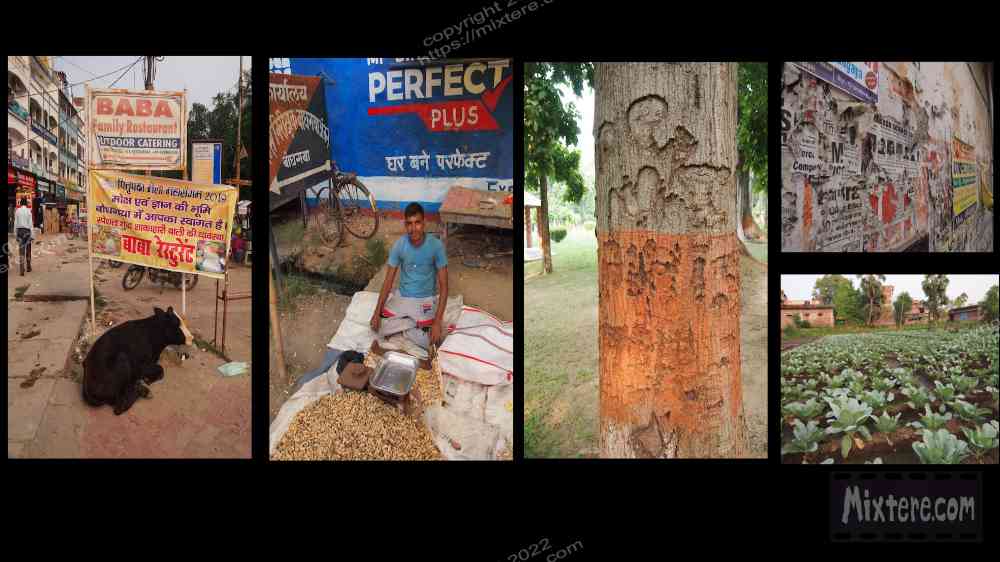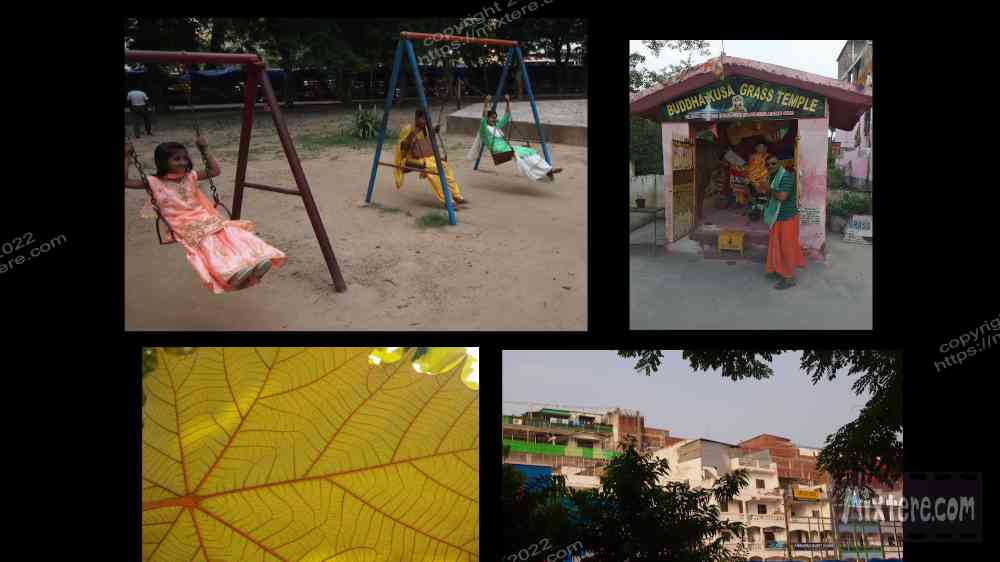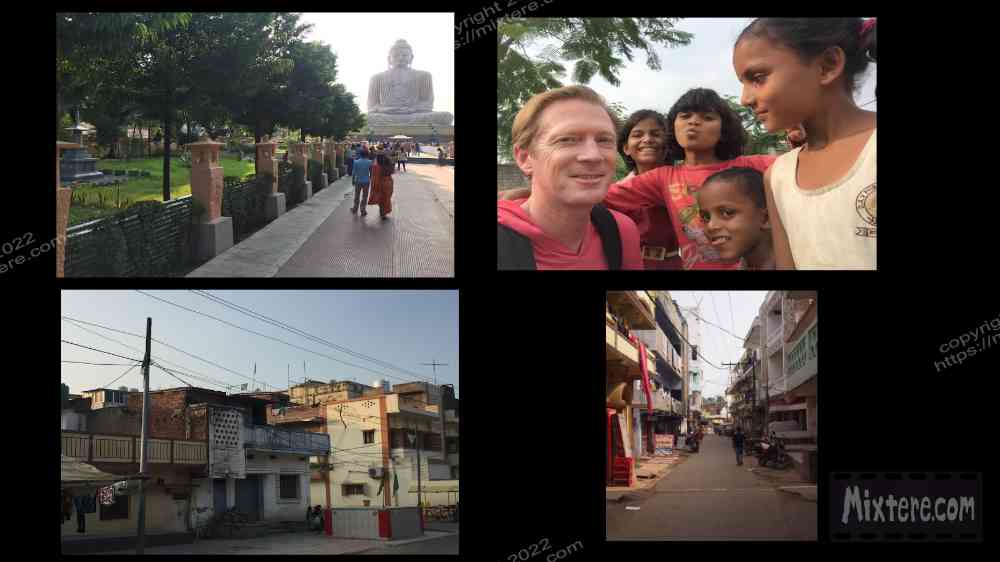
Slowly the reality of life in rural Bihar began to return to me. With this came the recurring lesson of what I call “selective memory.” In short, human memory is unreliable. It retains some events and hides others. It burnishes and distorts and obfuscates in the interest of the person and a certain narrative that somehow serves the ego. For example, suppose attending a school reunion and seeing a former classmate that your memory had completely expunged. But there they are, proving your memory unreliable. In a flash the recollection comes. “Oh yeah, Charles, now I remember him.” I was experiencing this as I began making my adjustment back to Bodh Gaya. As my body mended from all it was adjusting to a number of facts re-presented themselves after a long absence. I had forgotten about the sporadic presence of electrical power in India. I had forgotten about keeping candles in the Vihar dorm for these occasions. I had forgotten how intensely the sunlight felt there and how it elicited the fertile smell of the claylike earth. I had forgotten about how stifling the monsoon humidity becomes when the overhead fan stops moving and the temptation to remove the smothering mosquito net becomes overpowering. I had forgotten about how in India, services that are in fact unreliable, incomplete or downright nonexistent are often advertised solidly on offer. I had also forgotten that as soon as money is paid for these products or services, it is gone forever regardless of the results of the purchase. I had forgotten about the non-linear, non-Western approach that gets applied almost universally. When promised and often paid-for products and services (such as electricity, hot water, internet connection, television service, transportation, fax transmissions, agreed schedules and itineraries) fail, its common for people to shirk accountability.
This can be for a myriad of reasons. It is common for the person to shrug and point the finger at a previously undisclosed problem that they claim to have no control over, not known about or not remembered to tell you. Additionally, in a place like rural Bihar, people have learned to live with acceptance of things not working that are presented as functional. These scenarios and states of affairs are the very seeds of my learning to accept undesirables and do without. In time, doing something like waiting for a train all night and sleeping on the cold floor of the station, becomes no big deal. As I touched upon, the overly-romantic rumination of my "memory" had completely omitted how the foreigner is almost universally treated as a money-making or status-heightening opportunity to most Indians [that a backpacker like me encountered]. So it was shocking to have the scuttled remembrances return so suddenly.
Awkwardly and often painfully making the transition back to the land and culture that had drawn me was a dance of one step-backward, one step forward. Some lessons I had to learn the hard way, such as when I lost my cool and blew up at Iz because of the frequent blackouts, the glacial wifi speeds and the fact that my room had not been cleaned. My American combativeness in the guise of asserting oneself had no place here. Giving up cultural expectations takes time and can be painful because these operate on an unconscious level. Sometimes it took shame and pain to relearn, that speaking one’s mind or honestly discussing one’s feelings (especially anger) are not appropriate practices here. Through these remedial lessons I was reminded of what I had observed to be a deftness with which many Indians develop levels of tolerance and patience. These are things largely absent the American general public. As I hinted at, acceptance of things or people not being or functioning as they were presented is a challenging but essential hurdle for the linear-thinking Western visitor. With time one becomes able to identify the important causes worth fussing or fighting about and let the non-essentials go. To illustrate, my new response to finding myself in the dark with no fan to ward off the mosquitos was to became intimate with the mosquito netting, the candles and whatever else I did have. With time I adjusted to the sweltering heat and relearned to stay in between 10 and 4. When the promised wifi was clocking in at a whopping 2 megabits per second, I went with it. The Indians I was meeting only used their mobile for internet anyway, and had completely skipped using a desktop. As I slowed down I learned to ration my internet usage and make do with my daily mobile hotspot allotment. Soon I was not even using that. My imported compulsion toward the internet and its often hollow offerings subsided. I was slowly finding my footing.
Another thing that revisited my memory my relearning about "workarounds." As far as I could tell, many of the Indians I was interacting with had developed an infinite quiver of ingenious work arounds. The range seemed to extend to most aspects of life. No matter what the situation was, they usually had a work around. Disposable items could be repaired, ingenious solutions, repairs and workarounds sometimes comprised entire industries within communities. These on-the-fly workarounds would not be permitted in the litigious, licensed, permitted, predetermined bureaucracies of my home country. So again, the freedom to pivot and interpret was there in response to a shortcoming. I feel that I am coming up very short of being able to put this into words. But if you come, you will notice this. What I touch on above relates directly to the opportunity for more linearly-cultured foreign visitors to experience freedom from rigid rules they are accustomed to being confined to. Many rules and regulations can be stepped aside in India. This often means greater freedom as well as greater risk. This combination can be exhilarating… as well as terrifying. For example, a helmet is apparently officially required of motorcyclists but there is great freedom in adhering to or ignoring this rule. The same can be said of traffic or business rules, no-smoking rules, alcohol consumption in “dry” states, hidden options and upgrades relating to bus and railway travel, permitting and regulation shortcuts and countless other things. Extra money can be provided to make new options appear out of thin air or erase ones that had stood in the way. This can feel quite liberating, sometimes in conjunction with feeling maddening at the same time!

Below I attempt to provide some examples of what I am trying point out: [motorcycling] "You want to ride that Enfield with no license, shoes or helmet? It’s against the law but ok, go ahead, everyone does it. What’s that, you want to include your grandmother and two kids, a goat and those ten foot lengths of rebar on that motorcycle ride too? Ok, no problem. Just try not to clothesline that chai seller over there as there is a chance that a mob would form… and kill you." [hiking] "That’s quite a vista huh?! Well, yes, that is a 300 foot drop next to that shrine over there. Hmmm? The soil looks unstable due to erosion? Oh no, what erosion?! Bah, no railing no problem! Just go on over there and stand next to the shrine for a selfie! [the bus] "Well I know you paid for a seat but there’s no room on the bus due to technical difficulty (ie lining my own pockets and not staying up on the vehicle's maintenance). Why not climb up onto the roof and ride there? Just keep your head down on account of the low branches and power lines. Oh, and be mindful of the monkeys."
[the train] "Welcome to the Mahananda Express! We’ll get you there...eventually. Slowly slowly, sir, there is not need to rush. What? Well, yes- that is a door to the train open to the countryside blurring by at fifty miles an hour. Just don’t step too close and be mindful of the gap." "You must be hungry and thankfully the train is offering chicken biryani for dinner! Additionally, look, that wallah coming down the aisle is offering “piping hot” chai and vegetable cutlets. Where and when and by whom was that food made? Well, we have no idea! Bah! There is no need for pesky food safety measures! However, there is quite a chance you may be squatting in the toilet car with the squirts in less than an hour, or worse. Have you seen the toilet sir?" [fax transmission, from my old days] "What’s that, did the fax come in? Well yes sir, here it is. Come again sir? You can’t read it? Well… it seems the Indian satellite didn’t quite capture the transmission. It’s not my fault. No, I am afraid a refund is out of the question." [Travel red tape] "Hello sir, you need to extend your visa? Just go to the web portal and process it there. What’s that, you’ve tried a hundred times in the last four days? Well now that you mention it the website is overloaded right now [obsolete], try again later. (later) See, it’s working now. Huh? The site won’t accept your credit card? Well unfortunately you must be an Indian citizen with an Indian bank account to use that service. Why didn’t I mention that? Oh it must have slipped my mind. But it’s no problem, just come to the office tomorrow. I’ll send my cousin the taxi driver. He’ll give you a good price." [arranging transport] [the next day, the cousin picks you up... "Yes sir, 800 Rs to take you to the government office. [later] Ok we’re here sir. Oh and, on account of the fuel rationing the rate is actually 1200 Rs. What’s that, the doors to the office are locked?. Well… hmmm... it must have slipped my mind, today is actually an extension of yesterday’s holiday. What’s that, back to the hotel? That will be another 1200 sir. No we agreed upon a one-way trip, not round-trip. No I am not cheating you sir." [to the airport] "Whats that, you need to get to the airport swiftly? Ok no problem! What’s that? Oh don’t worry, I don’t use my headlights in order to save power on the battery. Don’t worry! Huh? You want me to stop driving into on-coming traffic at night with no headlights? Well I don’t see what the problem is but ok. But only because you asked nicely."
Before I move on I want to acknowledge a few things. First of all, if all is going well in one's life there is no need for a journey like the one documented here. This is not about some digital nomad living the good life abroad. This story is about a grueling journey to attempt to supplement for basic needs that were not met during development. And of course there is a futility in voyaging to far corners of the globe in order to discover places that really reside within oneself. Additionally, jarring cultural conflicts come with a journey like this. Adding that one belongs in neither the place or culture disembarked from nor those arrived in, as is the case with me, it makes it all the harder. This is not a vacation and there is no home to return to. All this said I am very much aware of the privileges present here... to be able to leave one's country, have the dollar as your national currency, be granted a visa and have enough money for airfare and travel abroad.

Most of the people I meet in this land have not had these or other privileges not even mentioned yet. What I write about here are my experiences, the experiences of a single foreign national in India. There have been commonalities that have repeated on my various trips here. Good ones and bad ones; I write about them both. But just because I experienced something does not make it a universal truth. But the best we can do as humans is speak from our own experiences. India remains a special place to me. The very land and sea has welcomed me. Many Indians have extended great hospitality and generosity to me. I still nurture gratitude towards these folks. I recognize that many of the Indians I met experience poverty, hardship and discrimination that I could never fathom. My intention is to share my experience, not to offend, shame or blame anyone. What I am trying to do here is express with truth and sincerity and without a spin to sell a presentation of something. That seems to be what the rest of the internet is for.


